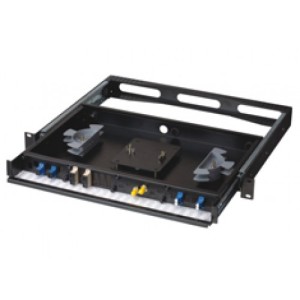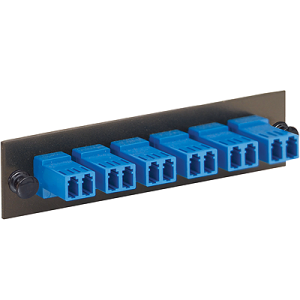Because the laser light is dangerous, and the ends of every fiber optic cable(have a small core) must be encased in some kind of enclosure. So, the enclosure not only protects humans from laser light but also protects the fiber from damage. Fiber wall plates and fiber patch panels are two main types of fiber enclosures. Previously articles have been discussed how to use a fiber optic patch panel. Now we'll learn about under what situation it can be used and where to buy.
As previously mentioned, fiber optic cables have a very small core that can be easily damaged if not protected properly. Also, to be consistent with the minimum size of a fiber optic loop and not violate the critical angle, we need to have a way to keep excess fiber optic patch cables, as well as terminated building fiber, neat and protected from damage. Fiber optic wall plates and patch panels allow the cable installer to protect the delicate fiber cable from damage, while still making it useable for the network administrator.
A common device that is used as a fiber optic cable enclosure is called a Lightguide Interconnection Unit(LIU), as showed in Figure 1. The LIU provides a location to terminate individual fiber optic strands into a patch panel, which will be discussed in the next article. A LIU is generally made of galvanized steel that is then powder-coated to provide durability. Most major LIU manufacturers make their devices 19 inches wide so they can be installed in a normal communications rack, If the LIU is to be located in an environment where there is a risk of moisture or corrosives, the LIU can be sealed with gaskets to make it virtually waterproof. Most LIUs have swing out trays in the front and the back to provide easy access to the patch panel to ensure that all loops are a minimum diameter, so the cable will not get damaged and maximum light can traverse the cable.

Figure 1. Lightguide Interconnection Unit(LIU)
Patch panels for fiber optic cables also called fiber patch panels, which are usually installed into the LIU. Because the core and cladding of two fiber optic cables that are to be joined together must match perfectly, the fiber patch panel must be manufactured to exact specifications and some standard type connector must be used to ensure a good fit. (fiber option connectors are discussed in the next section.) Another fiber patch panel issue deals with attenuation. Remember from the previous article discussed that when you splice or join a fiber optic cable, you can introduce additional light loss or attenuation. The same holds true for the fiber optic patch panel. The connectors on the patch panel should identify the total loss at various wavelengths, and these losses should be added to any other cable loss on that particular cable to ensure compliance with standard and good operation of the fiber optic cable. Figure 2 is a LC adapter panels (6 port fiber patch panel) .

Figure 2. LC fiber optic adapter panels
Fiber Adapter Panel (FAP) is used for patching a fiber cable to the enclosures like fiber wall cabinets, rack mounts fiber cabinets or rack mount fiber shelf. It allows you to make quick and easy fiber patch panel connections as they can snap into the fiber optic enclosures easily. Fiber adapter panels are designed to fit fiber optic blank patch panels, rack and wall mount enclosures. To purchase this kind of fiber adapter panels, please visit Fiberstore’s website (www.fiberstore.com).
Learn more about fiber patch panels:
No comments:
Post a Comment
Note: Only a member of this blog may post a comment.